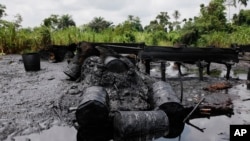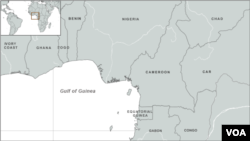WASHINGTON —
The vast Gulf of Guinea which is nearly as big as the Gulf of Mexico is now one of the most dangerous bodies of water in the world, home to pirates that attack oil tankers and other cargo vessels at will, raising fears that shipping lanes that have existed for 500 years could be permanently disrupted.
West African piracy centered on the Niger Delta has in recent years expanded from the coasts of Nigeria to the shorelines of many of the 11 West African countries that border the Gulf where pirates seize large oil tankers, siphon the product into smaller vessels, refine it in clandestine facilities and quickly sell it, fueling a regional oil black market.
Oil-consuming nations are concerned because more than 30 percent of U.S. oil and 40 percent of Europe’s oil passes through the Gulf and is vulnerable to West African piracy.
The largest foreign investor in Nigeria’s booming oil industry, Royal Dutch Shell, says that oil pipeline theft on land, and piracy at sea means about 100,000 barrels of oil are stolen every day in that country, costing the Nigerian government an estimated $12 billion a year.
Nigerian pirates in the Gulf of Guinea
“The Gulf of Guinea’s problem is not a dramatic rise in the number of attacks,” said Delex Systems Inc. analyst James Bridger for the U.S. Naval Institute in Annapolis, Maryland. It is “the expansion of a criminal enterprise once restricted to Nigerian waters.” The wave of piracy has spread to Benin, Togo and Cote d’Ivoire. Within the past 30 months, 93 tankers have been attacked, and 30 were successfully hijacked. In their latest raid, pirates seized a Turkish tanker off the coast of Gabon.
The Niger Delta is “the epicenter” of Gulf piracy, according to a report by Dryad Maritime Services, a maritime security intelligence firm in Portsmouth, UK. “Kidnapping is an endemic industry embedded within Nigerian criminal culture with the threat permeating both the land and sea domains. Foreign nationals remain a primary target for this criminal enterprise, due to the high ransom payments that can be achieved,” said the report.
“West Africa has reached a tipping point, like East Africa and South East Asia before it,” according to Bridger in Annapolis.
Not much protection for tankers
Recent anti-piracy efforts so successful off Somalia’s coast have had only limited success in the Gulf of Guinea because shipping companies are prohibited from hiring foreign armed security and foreign naval powers cannot pursue pirates in West African territorial waters where most attacks take place.
While most countries along the Gulf of Guinea have been unable to cope with the pirates there has been one exception; Benin.
“Beninois and Nigerian navies had a successful operation co-operation called Operation Prosperity which brought down the number of piracy cases drastically,” said Adjoa Anyimuda, author of a Chatham House report on West Africa’s maritime piracy. Along their short coastline Benin recorded 20 successful and attempted attacks in 2011. In 2012 there were only two.
But the number of piracy attempts are underestimated, Anyimuda said. Many attacks go unreported because shippers think local authorities are not capable of doing anything about the piracy or they believe “some elements within local authorities may be culpable.”
Despite regional prohibitions, some shippers still try to arm their vessels. Nine months ago, 15 Russian sailors aboard the MV Myre Seadiver were arrested by Nigerian authorities for possession of weapons and live ammunition.
‘It’s not a naval problem …’
The International Crisis Group argues that the solution to West Africa’s piracy is not more navies but a comprehensive regional reform of police enforcement and court systems currently incapable of handling the piracy crime wave, said Mark Schneider, director of ICG operations in Washington, D.C.
“Corruption has so weakened those institutions to begin with,” said Schneider, “that there is a major rescue effort that must be taken in order for them to become a real ally to the business community and the shipping community.”
“Nigerian criminal syndicates, backed by high-level political and economic patrons, are exploiting this situation by targeting specific tankers for hi-jacking,” said Bridger, the Delex Systems analyst. Dryad suggests the pirates’ efficiency may be linked to professional outside supervision from organized crime syndicates in Eastern Europe or Asia. But Schneider said that so far the pirated crude is only being traded on the West African oil black market.
Without more international attention, the ICG reports, “Piracy and other organized crime will continue to plague the Gulf of Guinea, raise energy prices in the U.S. and other markets and lead to further de-stabilization in an already fragile part of the world.”
West African piracy centered on the Niger Delta has in recent years expanded from the coasts of Nigeria to the shorelines of many of the 11 West African countries that border the Gulf where pirates seize large oil tankers, siphon the product into smaller vessels, refine it in clandestine facilities and quickly sell it, fueling a regional oil black market.
Oil-consuming nations are concerned because more than 30 percent of U.S. oil and 40 percent of Europe’s oil passes through the Gulf and is vulnerable to West African piracy.
The largest foreign investor in Nigeria’s booming oil industry, Royal Dutch Shell, says that oil pipeline theft on land, and piracy at sea means about 100,000 barrels of oil are stolen every day in that country, costing the Nigerian government an estimated $12 billion a year.
Nigerian pirates in the Gulf of Guinea
“The Gulf of Guinea’s problem is not a dramatic rise in the number of attacks,” said Delex Systems Inc. analyst James Bridger for the U.S. Naval Institute in Annapolis, Maryland. It is “the expansion of a criminal enterprise once restricted to Nigerian waters.” The wave of piracy has spread to Benin, Togo and Cote d’Ivoire. Within the past 30 months, 93 tankers have been attacked, and 30 were successfully hijacked. In their latest raid, pirates seized a Turkish tanker off the coast of Gabon.
The Niger Delta is “the epicenter” of Gulf piracy, according to a report by Dryad Maritime Services, a maritime security intelligence firm in Portsmouth, UK. “Kidnapping is an endemic industry embedded within Nigerian criminal culture with the threat permeating both the land and sea domains. Foreign nationals remain a primary target for this criminal enterprise, due to the high ransom payments that can be achieved,” said the report.
“West Africa has reached a tipping point, like East Africa and South East Asia before it,” according to Bridger in Annapolis.
Not much protection for tankers
Recent anti-piracy efforts so successful off Somalia’s coast have had only limited success in the Gulf of Guinea because shipping companies are prohibited from hiring foreign armed security and foreign naval powers cannot pursue pirates in West African territorial waters where most attacks take place.
While most countries along the Gulf of Guinea have been unable to cope with the pirates there has been one exception; Benin.
“Beninois and Nigerian navies had a successful operation co-operation called Operation Prosperity which brought down the number of piracy cases drastically,” said Adjoa Anyimuda, author of a Chatham House report on West Africa’s maritime piracy. Along their short coastline Benin recorded 20 successful and attempted attacks in 2011. In 2012 there were only two.
But the number of piracy attempts are underestimated, Anyimuda said. Many attacks go unreported because shippers think local authorities are not capable of doing anything about the piracy or they believe “some elements within local authorities may be culpable.”
Despite regional prohibitions, some shippers still try to arm their vessels. Nine months ago, 15 Russian sailors aboard the MV Myre Seadiver were arrested by Nigerian authorities for possession of weapons and live ammunition.
‘It’s not a naval problem …’
The International Crisis Group argues that the solution to West Africa’s piracy is not more navies but a comprehensive regional reform of police enforcement and court systems currently incapable of handling the piracy crime wave, said Mark Schneider, director of ICG operations in Washington, D.C.
“Corruption has so weakened those institutions to begin with,” said Schneider, “that there is a major rescue effort that must be taken in order for them to become a real ally to the business community and the shipping community.”
“Nigerian criminal syndicates, backed by high-level political and economic patrons, are exploiting this situation by targeting specific tankers for hi-jacking,” said Bridger, the Delex Systems analyst. Dryad suggests the pirates’ efficiency may be linked to professional outside supervision from organized crime syndicates in Eastern Europe or Asia. But Schneider said that so far the pirated crude is only being traded on the West African oil black market.
Without more international attention, the ICG reports, “Piracy and other organized crime will continue to plague the Gulf of Guinea, raise energy prices in the U.S. and other markets and lead to further de-stabilization in an already fragile part of the world.”












